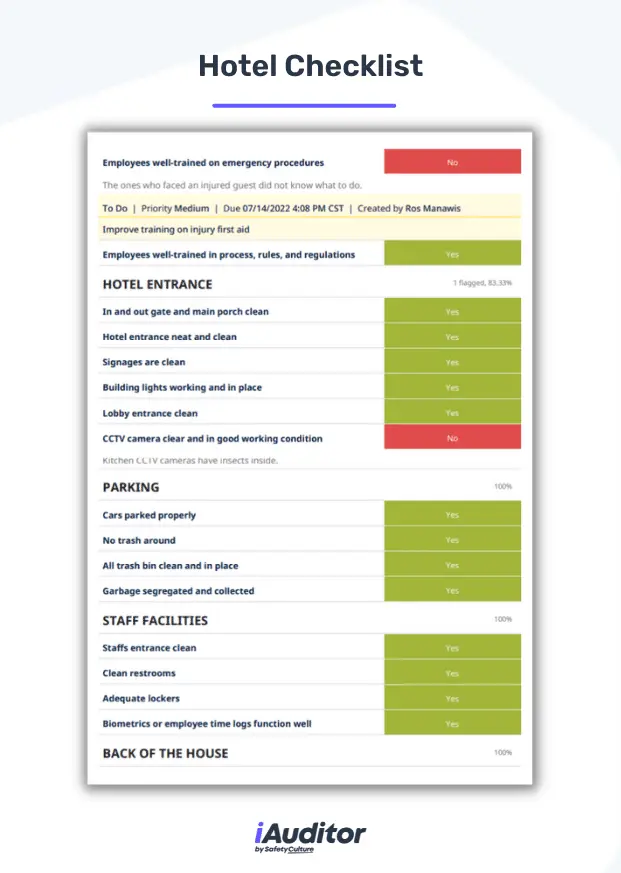What is Hotel Management?
Hotel management refers to the overall management of tasks done in a hotel. This includes housekeeping of hotel rooms, food inventory management of in-house restaurants, finance management, distribution, and customer service. Hotel management is a continuous, round the clock, responsibility and is always constantly evolving depending on the market and the needs of a specific hotel’s customers.
History of Modern Hotels
As long-distance travel in the medieval ages took days, it was common to seek shelter in the middle of one’s trip to rest for the night. Initially, travelers stayed in people’s homes, borrowing a room or bed, or anywhere they’re allowed in the property. These rooms were called “hospitia,” derived from the word “hospitality.” From there, businessmen realized that housing travelers can be a profitable business, leading to hospitia rooms being commercialized and the creation of inns.
Most of the first inns were found around Europe and were catered to pilgrims and government workers. These inns provided lodging and no food or other amenities, as their primary purpose was to give travelers a place to rest in. However, as time passed, in-house restaurants began growing famous, followed by a wide variety of amenities offered for leisure.
It wasn’t until the introduction of guest registers that inns slowly became the modern hotels of today. They began to provide more to their guests, turning the act of staying in an inn or hotel into something leisurely. Following the industrial revolution, travel became easier and hotel establishments also changed their plumbing and structural forms, providing guests with baths and later, free soaps. They also began employing staff members to come in regularly and take days off as they pleased, turning hotels into a place of work as well.
With travel becoming easier and more affordable, different types of hotels were created in time with a boom in tourism worldwide. This led to a boom in hotels as well, creating more management processes and thus creating the modern hotel management system today.
Difference Between Hospitality Management and Hotel Management
Hotel management and hospitality management are both parts of the tourism sector and deal with interactions with customers. However, their main difference lies in the nature of their work.
Jobs related to hospitality management are concerned with different industries such as food and beverage, travel, event management, casino management, resort management, and more, making it an umbrella term. On the other hand, hotel management is different as they only focus on the hotel industry.
However, the principles of hotel management are also tied to hospitality, making it fall under hospitality management. This is because hotel managers carry out the same tasks while still putting hospitality at the center of their work, but centralizing it to their establishment.
Importance of Hotel Management Systems
Managing the different aspects of a hotel can be a stressful task, especially for head hotel managers who have to oversee everything. With the rise in customers and hotels around the world, hotel managers have switched from using traditional guest lists and other checklists and using digital templates instead.
Hotel management systems and software or apps today are now substituting the traditional pen and paper ways of documentation. With these, hotel managers can oversee their establishments and workers from anywhere in the hotel and anytime, all in one place. This can save them time from doing multiple rounds of inspection on foot, personally approaching their staff, and watching all of their tasks at once. The time spent can then be used on other essential tasks that need more concentration and effort. Having their documents digitized also promotes less waste in the workplace as it removes the need for paper and stores all digital paperwork in the cloud.
Some things having a hotel management system can help with are:
- Keeping track of guest lists and reservations
- Managing customer data and customer service
- Creating and maintaining housekeeping schedules
- Training housekeeping and other related hotel management staff on work, health, and safety procedures
SafetyCulture for Managing Hotels
A hotel management app hotel managers can consider using is SafetyCulture (formerly iAuditor). SafetyCulture can help with hotel management by making processes more seamless and efficient with its smart checklists that can be used for related tasks. Hotel managers can choose to create their own checklists from scratch, upload their existing ones into the app, or use a pre-existing template from the Public Library and modify accordingly based on their needs.
Using SafetyCulture, hotel managers can improve safety in the workplace by making it easier for employees to alert others of problems by reporting Issues, assigning Actions to address them, and raising a Heads Up to their team. Reported problems can also prompt certain actions to be taken or for additional fields to appear for employees to provide more details, as well as photos, videos, and notes.
Other things possible with SafetyCulture are:
- Using QR codes for faster inspections of guest rooms, service areas, and other amenities while on the go
- Generating analytical reports based on completed inspections
- Monitoring temperature-sensitive locations and tasks by integrating sensor readings into checklists
- Managing cleaning, housekeeping, and maintenance shifts by scheduling inspection and cleaning times in-app
- Sharing templates and completed inspection checklists to the whole organization or to specific individuals only
- Ensuring compliance with different hotel standards such as the Forbes standards and Leading Quality Assurance (LQA) standards
Learn more about how SafetyCulture can help with hotel management with Accor Hotel Group’s story. SafetyCulture has not only improved their hotel management, but also their revenue and their reputation among customers and other hotels.
Using SafetyCulture, they were able to address customers’ issues promptly, save time, and improve on their operational efficiency with minimal effort. All audits are synchronized in real time and stored in one place, making it easy for all leaders to gather data immediately and make changes to their processes as needed.





